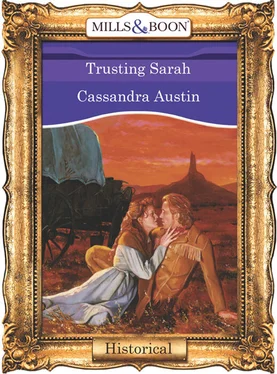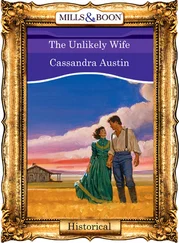Milburn pointed a finger at Sarah. “Don’t think you’re going to be left out. There’s always more men than women, and someone will come get you sooner or later.”
It turned out to be sooner. A man whose wife was already in a round needed a partner and, seeing Sarah, hurried over. While Eli tried to protest, Milburn waved her away.
The dance sent everyone spinning from one partner to the next with a momentum greater than the music warranted. The music grew louder as the dance brought Sarah closer to the players and faded at the other end of the circle. The campfires seemed to flash by. When she came to Rice, he grinned and whirled her into the arms of her next partner.
When the music stopped, Sarah found herself standing next to her last partner. “My name’s Gaines,” he said, taking her elbow and pulling her out of the crowd. He was of less than average height but broad and heavily muscled. “Folks call me Bull.” He drew himself up in a way calculated to impress her.
“Sarah Tanton,” she said. Even in the uncertain light she recognized him as the man who had objected to stopping on Sundays. It was silly since she had just danced with him, but she didn’t want to shake his hand.
The musicians started again, and he reached out to pull her into the dance. She stepped away. “I have to get back.”
“Anyone that wants you will know where to find you, missy.” He caught her arm and forced her toward him.
The tune had no established steps, leaving the dancers free to improvise. Bull kept Sarah on the edge of the crowd. “You traveling with Milburn’s bunch?” If it was a question, he didn’t wait for an answer. “I seen you with him and that old man.” He was leaning closer to be sure she could hear, and Sarah drew away. “You that old man’s daughter or somethin’?”
Sarah thought of saying she was his wife. It wasn’t natural for her to lie, however, and she told him Milburn had hired her. Seeing his leering face in the light of one of the fires, she regretted her honesty. When the dance was over, she stepped away. “I have to get back.” She wanted to run, but hesitated. The dancing had ruined her sense of direction.
“I’ll walk you to your wagon, missy,” he said. Again he didn’t wait for a reply but took her elbow and started away. “I’m traveling with my friend, Herman Kirby,” he told her. “Him and my brother’s boy, Nathan. He’s alone now ‘cept for me.” He led her slowly around the circle of wagons, tipping his hat to the folks they passed. “We’re gonna take land in Oregon,” he went on. “Each of us will take a piece, but I’ll have to run it all, ‘cause they ain’t exactly up to it.”
Sarah gave no answer, but he didn’t seem to expect one. “That’s my wagon,” she said when she saw Eli. She was actually glad to see the grumpy old man. Without looking back for fear Bull would take it as encouragement, she went directly to the wagon and climbed inside.
“Who’s that?” she heard Eli ask in his usual gruff tone.
“Oh, his name’s Gaines,” Milburn said. “He’s a little hard to get along with, but I guess he’s all right.”
In a few minutes Sarah climbed out carrying her sewing basket. She wouldn’t have time to do any mending until after supper, but getting it was an excuse for hiding in the wagon.
“I don’t like his looks,” Eli said, scowling at Sarah.
Sarah stared. How could he blame her?
“Well, Eli,” said Milburn, “I don’t reckon he likes your looks, neither.”
“We thank the Lord for leading us to this grassy meadow,” Reverend Fleenor shouted with outstretched arms. “As long as we are faithful, He will lead us safely to our new homes.”
The dance floor of Saturday night had become the church of Sunday morning. Nearly all the travelers had left their work to listen to the reverend and add their voices to the hymns.
“Chances are I’ll hear it all from here,” Eli had said. “But ya go on, Sarie, if ya want.”
Noticing the disdain in his voice and certain his humor would be even worse if he had to do the baking alone, she decided to stay and help. He turned out to be right; they didn’t miss a word. The effect of the sermon was somewhat changed, however, by Eli’s continual comments.
He thought, for instance, that Milburn should receive the credit for leading them to the meadow. When Sarah pointed out that Milburn had found it, not made it, Eli grunted and told her to knead the dough.
Emotion made Fleenor’s voice crack. “Everything, from the fall of a leaf to the birth of a child, is God’s will.”
“I reckon ya go along with that, too,” Eli said, reaching for the flour to mix up a second batch.
“I guess so.” How had she gotten herself into this kind of discussion, and, more important, how could she get herself out before she made Eli impossibly angry? She had been working for Eli for five days, and this was the first time she had dared to disagree with him.
“Ya guess so,” Eli repeated slowly. He slammed his spoon into the dough. “What about death?”
“Every sorrow,” Fleenor said, as if in anticipation of Eli’s argument, “is God’s will.”
Eli grunted. “Then He wills more pain than He’s worth.”
Sarah looked at Eli, shocked by what he had said and by the fact that he had said it so loudly. She didn’t have the nerve to see if anyone else might have heard.
“Let me ask ya this,” Eli went on, trading the dough he had finished mixing for what Sarah had kneaded and motioning her to continue. “Yer life weren’t all parlor games and gay-las back home or ya wouldn’t be moving west. Am I right?”
Sarah was sure her expression held a mixture of disbelief and fear. She quickly looked away.
Whatever Eli read in her expression didn’t discourage him. “Well, do ya think ya deserved whatever it was that made ya want to start over?”
The reverend’s shout seemed to be directed at her alone. “God punishes us for our sins. If we did not sin, there would be no sorrow.” She swallowed but couldn’t make her voice work. Finally she nodded.
Eli grunted in disgust. “Well, too often the sorrow goes to someone other than the fella committin’ the sin.”
When both batches of dough were shaped in cloth-covered pans and set in the sun to rise, Eli found other work for Sarah, all of which kept her near the wagon where he could bait her with questions she couldn’t answer.
When he finally sent her to the creek with a bag of clothes to wash, she wanted to run. Sheltered by the trees, she dropped the bag on the ground. How had Eli guessed she was running away? What could he further guess from what she had said? Nothing, she hoped.
When she heard a twig snap, she jumped. Grabbing the laundry, she tried to look busy. In a moment Martha Williams joined her.
“I saw you come this way and thought it would be more fun to do this with a little company,” she said. She upended her basket, letting the clothes spill to the ground. Kneeling on the bank, Martha wet the first garment and rubbed it with her cake of soap. Sarah followed her example. “You look kind of pale, dear. Are you feeling all right?”
“I’m fine,” Sarah said, afraid to look at her companion.
“Please don’t worry,” Martha said. “You can talk to me. I saw how that old man made you work all morning and miss the service.”
This time Sarah did look up. Would deception be this easy? Letting Eli take the blame for her uneasiness wasn’t a lie, anyway. “It doesn’t matter,” she said, realizing how easily the quiver in her voice could be misinterpreted.
Martha looked sympathetic. “Where you from, honey?”
“New York.” Sarah braced herself for more questions, but Martha just wanted an opening to talk about herself.
Читать дальше












